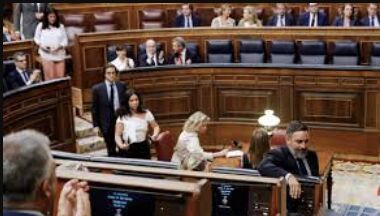Spain's Parliament Breaks Language Barriers: Catalan, Basque, and Galician Now Allowed for the First Time
Spain's Parliament has allowed the use of Catalan, Basque, and Galician for the first time, a significant step for language diversity. The move has faced opposition from conservative parties. The recognition of these minority languages aligns with the goal of forming a left-wing government and seeks recognition within the European Union. While this could open the door for other minority languages, unanimous agreement is needed. Spain's Constitution recognizes the co-official status of minority languages, but Spanish remains the official language. The government has offered to cover translation costs for the new languages.
In a significant development for language diversity in Spain, the country's Parliament has allowed its national legislators to use Catalan, Basque, and Galician for the first time. The reform of the linguistic policy of Spain's lower chamber was a demand of Catalan separatist parties, who supported the appointment of a Socialist as the new Parliamentary Speaker. This move comes after inconclusive national elections in July and reflects the long-held objective of smaller parties from the regions in Spain's north with bilingual populations.
The Madrid-based Parliament provided simultaneous translation with earpieces for the 350 members of the chamber, as well as for the nationally televised transmission of the session. However, the conservative opposition voiced its disapproval, arguing that the reform would make debating more difficult. The Socialist Party was criticized for giving in to pressure from Catalonia's separatists. Members of the far-right Vox party, which holds ultranationalist views towards Spain's regional and linguistic diversity, even walked out of the chamber when the use of these languages was exercised.
Catalan, spoken by around nine million people in various regions of Spain and France, Galician, spoken by approximately two million people in northwestern Spain, and Basque, spoken by 750,000 speakers in Spain's Basque Country and Navarra regions, will now have representation in the national Parliament. This effort to recognize and support Spain's minority languages aligns with acting Prime Minister Pedro Sánchez's goal of forming a left-wing government with the backing of nationalist and separatist parties from Catalonia and the Basque Country. Spain's government is also seeking to have Catalan, Basque, and Galician recognized as languages that can be used in the European Union.
However, the EU's General Affairs Council debated this inclusion but was unable to reach an agreement, with some countries stating the need for further study of the proposal and its implications. While the EU already has 24 official languages, the inclusion of Catalan, Basque, and Galician could potentially pave the way for other minority languages in Europe to seek recognition. However, the unanimous agreement of all 27 EU members is required for any new language to be recognized. Sweden's European Affairs Minister Jessika Roswall emphasized the need for further investigation into the proposal from legal and financial perspectives.
Spain's 1978 Constitution recognizes the co-official status of minority languages alongside Spanish in regions where they are spoken, and their use is common in regional parliaments and town halls. Spanish, also known as Castilian, is spoken by the majority of Spain's population and is recognized as the official language of the country. Spain has recently offered to bear the cost of translation services for the new languages in order to facilitate their use in Parliament.




